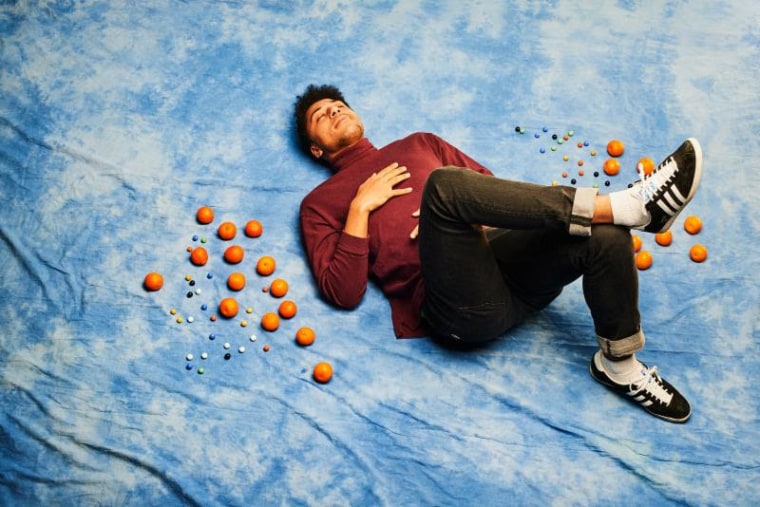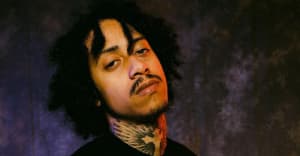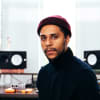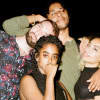How Harrison Got Healthy And Found His Voice
The Toronto producer shares a new music video and describes balancing his passion for learning with mental health.
 Photo by Phillip Skoczkowski
Photo by Phillip Skoczkowski
Harrison Robinson’s bright and tidy studio is tucked into the second floor of his parent’s suburban home in Toronto’s east end, and is as inviting as the gregarious 21-year-old producer himself. Against one wall, a library of records — including lots of classic soul and retro pop — reaches almost to the tall ceilings. Greenery peeks in from outside the windows and a large, busted anime figurine rested on the turntable. His vintage synths partition a small living space that includes a thick, inviting couch and big-screen TV. It’s both studio and sanctuary, designed by a solitary dude, for both maximum productivity and long stretches of alone time.
Harrison has struggled with anxiety and depression, and if it’s true that our workspaces reflect our inner lives, his immaculately arranged comfort zone is quite a distance from chaos and clutter. “This album should have been done four months before it was,” he admitted, talking about his hyperglossy debut Checkpoint Titanium. “But I just needed more time.” Time was a wise investment, and contributed to a deeper understanding of the themes present across the producer’s work: future funk, classic video game composers, and anime soundtracks like Samurai Champloo’s beatific hip-hop beats. Harrison hopes the “elemental” nature of the songs comes through because, “the record was inspired by my hypest walks, in downtown Toronto and my neighborhood."
Today, The FADER is premiering the video for "Vertigo," a highlight from Checkpoint Titanium that features Toronto singer a l l i e. "'Vertigo' was going to be an instrumental," Harrison said, "but I've known a l l i e for years and thought she'd be good on it. She works a lot in R&B, and her voice has this sex appeal thing, so I thought 'Why not put her on a pop song, some early 2000s shit?'" Harrison and a l l i e flew out to Portland, Jamaica to shoot the clip, which is idyllic in every sense until the pair eat some trippy fruit. Watch it below, then read about how Harrison expanded his skills without sacrificing his well-being.
HARRISON ROBINSON: I’ve just started feeling proud of my stuff for the first time. I always liked it, but was never like ‘Good job!’ I loved making my older music, but it’s not my most honest work. I wanted to make a specific sound that I had heard on Soundcloud before. I was imitating [the excitable, future bass-inspired producer] Wave Racer, basically. It’s nothing against that genre, but I shouldn’t be making it. I just want to be myself. To get there, I took care of myself before I started thinking about music, making sure my anxiety and depression were in check. Music is the only sure thing that I have. Even if I go deaf, I still have my heartbeat. It won’t betray me, it’s just there. [My music] keeps evolving, and that’s OK — that’s not the same thing as decay and death. But you have to take care of yourself first. I get stress headaches that feel like this elastic band is tightening around my skull. When that happens, my mind tricks itself into thinking I’m really sick and going to die. At a certain point it was happening like six times a day and I couldn’t handle it, so I went to the doctor and it started getting better. You gotta be healthy. But also when you make music what you create reflects your mood, so I wanted to make sure I was OK with myself.
I want to take classical piano lessons. Jazz is a blast, but the thing that fucks me up is the concept of “jazz lessons.” Jazz is something I want to learn from peers. I don’t want to be taught it, I want to grow with it. Classical music — I think of it like a videogame or something. How well can you do on this piece? How well can you sit? It’s more quantifiable.
It’s not that I feel limited by my current skills, but it’s always good to know shit. I personally think anyone can write songs. You can learn four chords and make a song, but you should know your way around a keyboard as well. It helps to create beautiful songs, songs that speak to people more. You don’t need to know theory, but you should understand what you’re sampling. Or if you’re a trap producer using just three notes and arpeggios, learn a library of drum patterns and make sure they hit really hard. Just have a bunch of tools you can use. Great producers might not have an understanding of theory, but they know how to get the sounds they want.
I don’t make music every day, because I don’t want to turn into a fucking raisin or something from trying to pump out stuff. Just thinking about it gives you anxiety, like, Oh my God, people do that, and they do it really well. I just have to remember that I do this for myself, and to just be super assertive when someone else’s schedule can get in the way of your own mental health. Last Gang Records and my manager: I love them so much, they were totally cool. But I needed to be assertive and on top of my own issues, because if you’re not it can really fuck you up.


